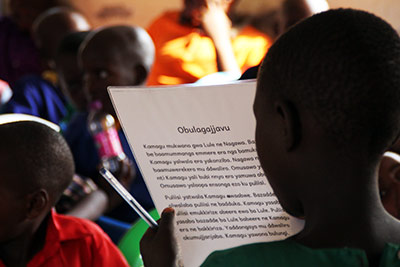Books, when readily available, can easily be taken for granted. But they are a powerful tool for building imagination and self-esteem. As Ms Irina Bokova, Director-General of UNESCO has said, “Literacy is the door to knowledge, essential to individual self-esteem and empowerment. Books, in all forms, play an essential role…”
This reading competition not only brought a community together to celebrate reading and provide books, but it was appreciated by the District Education Officers who are now encouraging schools to organize more of these, in classes, to build confidence among learners and provide creative outlets for them to practice their reading skills. The event is also helpful for the teachers to evaluate their students. Charity Baguma, the event organizer, reported that the event “communicated that some children still had fear of talking in front of the groups, others couldn't read a word; while other schools were putting books to excellent use, and this was evident in the reading skills of their learners.










